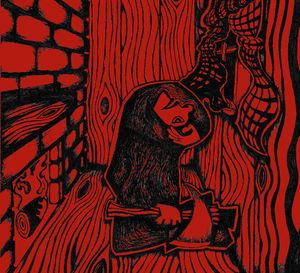 Mike Oberst – Six Feet of Earth
Mike Oberst – Six Feet of Earth
Reggieville Records – 12 October 2019
Clawhammer banjo maestro and frontman with punky Cincinnati string band folksters The Tillers, multi-instrumentalist Mike Oberst also has a side career as a preservationist and singer of traditional folk music. Six Feet of Earth is his second such solo undertaking, accompanied here by Patti Walker on hammered dulcimer, Tim Britton on uillean pipes, cellist Kate Wakefield and Tyler Randall on sitar, although this time around he’s extended the spectrum to embrace music not entirely from the public domain.
It is, however, from the traditional canon that the opening six-minute number comes with Who Killed Poor Robin, the English nursery rhyme Who Killed Cock Robin restored to its rightful form as a stark bluegrass murder ballad that begins with shruti box drone and bluesy harmonica before Oberst’s reedy whine kicks in. The following four tracks remain in traditional pastures, although Gypsy Davy, originally a Scottish border ballad, appears here credited to Woody Guthrie and modelled on his reading and lyrics with a shuffling, fingerpicked old American folk treatment, while fiddle and foot stomps provide the momentum for The Derby Ram, the English song of the title interpolated with the chorus from the American tune Didn’t He Ramble, most likely written in 1902 by Robert Cole though generally credited to Will Handy. Next up, taken at a sparse, doomy strummed pace with cello drone, is North Country, a self-penned but persuasively traditional sounding song from the perspective of early settlers heading out to seek new pastures, the roaming and rambling narrator thinking back in later years to that old family ground, the run rounded off with a sprightly banjo anchored take on Frosty Morn, otherwise known as the traditional fiddle reel Cold Frosty Morning.
Research suggests the piano accordion-accompanied title track (Six Feet of Earth Makes Us All One Size to give it the full name), an old sway-along bluegrass spiritual about how death is the great leveller, was written in 1878 by one K.W.Helmick, but it’s popularly ascribed to Oscar L. Coffey who recorded it in 1928, although his version was slightly faster.
It’s back to England for a classic Ewan McColl number, a fine strummed guitar and fiddle arrangement for School Days Over about leaving education behind to work in the pits. McColl was, of course, also a union activist, which provides a perfect link to the subsequent track, The Rebel Girl which, featuring lead guitar from Maria Carrelli and Jean Dowell on vocals, was written in 1915 by union organiser Joe Hill (who also wrote There Is Power In A Union) for Elizabeth Gurley Flynn, a leading feminist and founding member of the American Civil Liberties Union who used the title for her autobiography.
A somewhat unusual choice follows with a song out of the Brill Building hall of fame, Clyde Brown from a 70s incarnation of The Drifters adding his deeper soulful tones to a fine stripped back folk guitar and cello interpretation of Goffin/King’s Up On The Roof, but surely deserving the trad tag as much as anything else here.
Preceded by the 18th century Scottish fiddle tune Flowers of Edinburgh, here played on guitar and dulcimer, it ends on a suitably downbeat note with one of Oberst’s, a slower, drone-backed revisiting of Willy Dear from The Tillers’ 2013 album Hand on the Plow, a variation on Fair Margaret and Sweet William inspired by a Kentucky ghost story about a woman watching her lover return from sea when the boat suddenly explodes and she hangs herself, unaware he’s survived, the song ending with a snatch of the tune from The Girl I Left Behind Me.
While there’s many an American artist keeping alive the old bluegrass and country songs, especially from the Appalachians, there’s too few doing the same for the rich heritage of traditional Anglo or Scottish-American folk ballads from the 17th and 18th centuries. We need more like Mike Oberst.

